Neil Peart's News, Weather and Sports
Witness To The Fall
NeilPeart.net, November 17, 2012
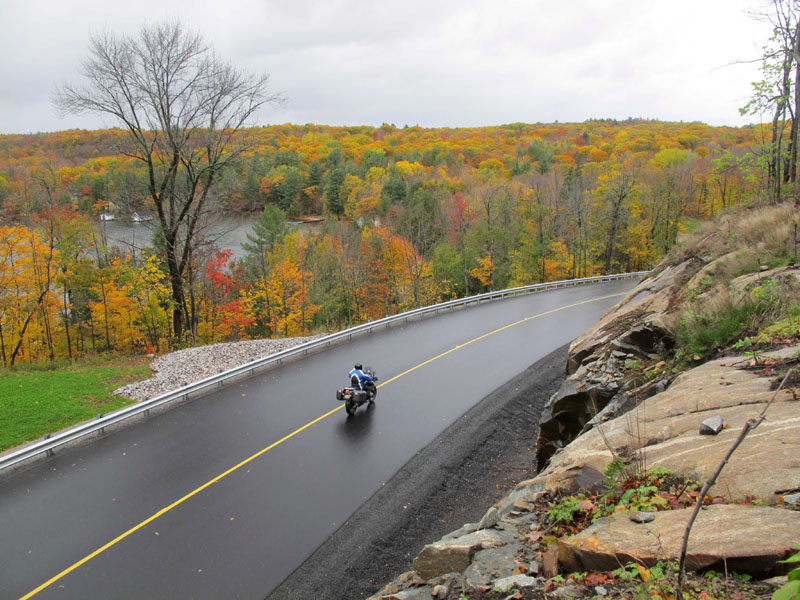
It was a chilly, rainy day in mid-October, amid the radiant fall colors of Ontario's Muskoka region, the lower belt of the boreal forest. Boreal means "northern," as aurora borealis means northern lights, and true boreal forest stretches only across Canada, Scandinavia, and Russia. Other northerly regions offer spectacular displays in this season, like the brilliant yellow aspens and larches in the mountains of the West, or the more muted but still colorful palette down through the Appalachians, but nowhere else does the mix of tree species create this splendid autumn variety of yellow, gold, orange, and crimson.
To capture this image, your intrepid reporter had to park his motorcycle at the roadside and climb high through wet underbrush and slippery mud to the rocks in the foreground, the Canadian Shield, sculpted by glaciers and erosion. Standing above the rain-shiny road as it curved around Lake Windermere, I waved down to the waiting Brutus to ride through the shot a couple of times.
A few days before, Michael and I had been wandering up and down the backcountry of Pennsylvania and New York, but even on bright, sunny days, the treescapes didn't seem as vivid as my memories of the season from Ontario and Quebec. I was guessing that during our short tour break in early October, we must have missed what can be the briefest season - full-on autumn. I wondered if there had been some wind and rain around there, because that kind of weather will bring down the colorful leaves prematurely. But locals I spoke with didn't recall strong winds or rains in recent weeks, so I figured we had simply missed it.
Then, on the day off between the two Toronto shows, Brutus and I rode north, and there it was, all around us. Even in the flat light of a dull and rainy day, the trees emanated a radiance that seemed luminous, as if lit from within.
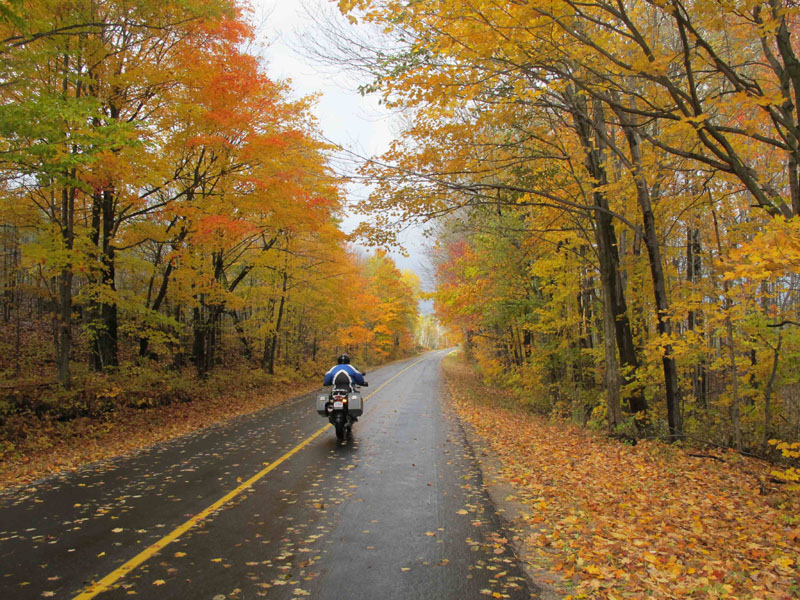
Any time the rain let up long enough to allow us to get the cameras out, we stopped and photographed each other riding through it.
Between the Toronto shows and Montreal, Brutus and I explored the backroads of Eastern Ontario and Quebec, and once again we were kind of "in our own backyards." We had both lived in those cities and areas at different times in our lives. The idea of backyards - as in the "NIMBY" principle, "Not In My Back Yard" - had been on my mind lately, in New York State and Pennsylvia, and now in Ontario. Along the country roads and in small towns I saw signs in people's front yards, some protesting the "fracking" I wrote about last time (oil and natural gas being extracted by hydraulic pressure), with the word "Frack" in a red circle with a slash through it, while others apparently worried about the local drilling of oil ("No Drill/ No Spill"), and some even spoke against wind turbines. In an area of Upstate New York where there were hundreds of them, a sign showed a drawing of a turbine above the caption: "It's a SWINDle."
In Central Ontario I saw signs against a proposed hydroelectric station, too. So it appeared people didn't want oil, natural gas, wind, or hydro power, at least in their own backyards.
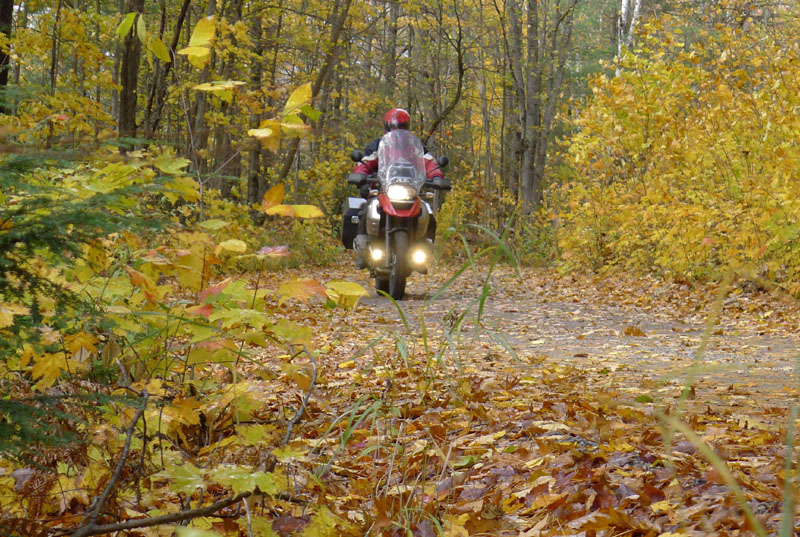 |
Muskoka Trail |
Further south, though, in the coal-mining areas of Pennsylvania, West Virginia, and Southeastern Ohio, the message was different - billboards and signs spoke in support of the coal industry. They wanted to keep it in their backyards. As discussed in my previous story, "The Better Angels," you can't blame them, because it's a livelihood for their families and communities. But on reflection, I was pretty sure it was the bosses, not the workers, who posted those messages ...
Southeastern Ohio is a region I have come to greatly appreciate for its hilly countryside, winding little roads, pretty farmland and woods, modest churches, and crossroads villages. In that area a more complicated story was playing out. I hadn't traveled around the United States in October during an election year since 1996 (Clinton vs. Dole), and this time, in 2012, I was equally fascinated to watch the vast mechanism of democracy in action. Placards and staked signs at every intersection, and many front lawns, exhorted Americans to turn out and vote for everyone from local tax commissioners and school board officials to Obama-Biden or Romney-Ryan. As Michael and I wound our way through chilly rain across the rural counties of Southeastern Ohio, many lawns were decorated with signs reading, "Stop the War on Coal - Fire Obama."
I could only guess we were in a strongly Republican region, but the opposite was true - many local voters were traditionally Democratic, and were being blitzed by an invented issue that pretended to threaten them. (As Michael scoffed, "There is no 'war on coal!'") Because Ohio was an important "swing state" on the federal level, it seemed to be an effort to scare them into voting Republican. (Results in those counties did swing that way.)
A story I saw about coal miners complaining that their employers had ordered them to show up at a rally for Mitt Romney, without pay, took place in that same corner of Southeastern Ohio.
One sign spoke from a different, harsher perspective:
"Prosper America - Frack, Baby, Frack."
That slogan was patterned after "Drill, Baby, Drill," a 2008 Republican rallying cry in support of the indiscriminate drilling of oil wells - as mouthed by the likes of Sarah Palin. After the disastrous oil spill in the Gulf of Mexico in 2010, the slogan became less politically acceptable, and was ridiculed with variations like "Spill, Baby, Spill," and "Kill, Baby, Kill."
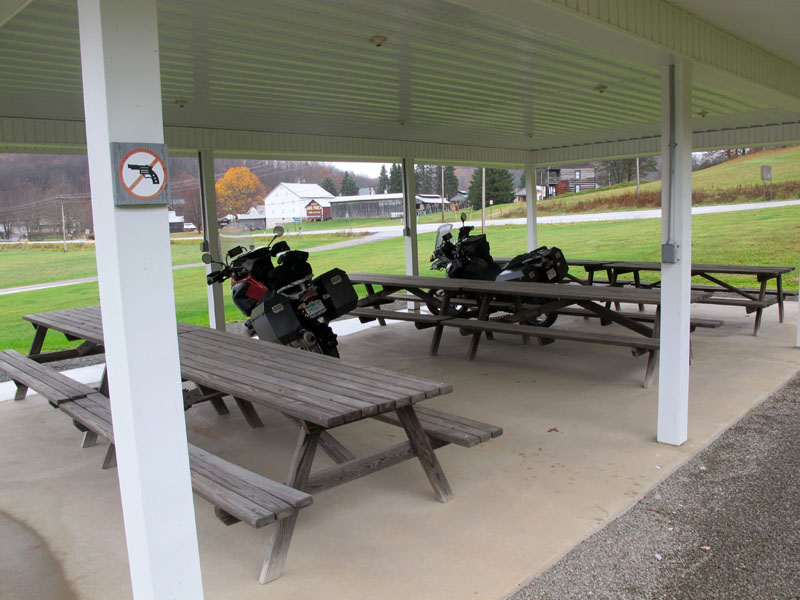
One friendly feature in small-town Ohio is the great number of picnic pavilions - very welcome for a motorcyclist on a rainy day. Elsewhere, shelter for a rest and a smoke can be hard to find - unless you come across a spray-wash - but every little village in Ohio seems to have a covered picnic pavilion. This particular setting tells a few other stories. Apart from the somewhat jarring "no handguns" sign on the post, across the road is an old square-log farmhouse, rambling barns (one painted with the venerable "Chew Mail Pouch Tobacco" advertisement), and a tree in autumn flame in front of the wooded hillsides of late fall.
I also notice now that the overhead lightbulbs in the pavilion have been removed, presumably only installed when they are needed. Probably that gesture is more against "unauthorized illumination" in a place like that, rather than vandals - though it's hard to know, given that "no handguns" sign.
That day Michael and I were on our way to Marietta, Ohio, for the second time this tour. Typically, our day-off destinations are not chosen for themselves, but for the roads that lead to and from them - the most scenic and serene ride we can have, leading to a place just big enough to have a motel and a restaurant, and not too far from the next concert venue.
Back in September, we had rolled into Marietta from the southwest, and found ourselves at the small city's main intersection, right on the bank of the wide Ohio River. We paused in front of an old hotel on the corner, the Lafayette, and gave it a look-over. Such places are a gamble. For a start, they are not as convenient as the classic (and disappearing, alas) motels where you park in front of your door. Your luggage has to be carted inside, upstairs, and often down long narrow hallways, and often the bikes have to be parked in a garage that might be several blocks away. Also, an old hotel can be ... an old hotel.
I asked Michael to have a look inside, and see what he thought. He came out with a thumbs-up, so I started unloading my bike while he checked us in.
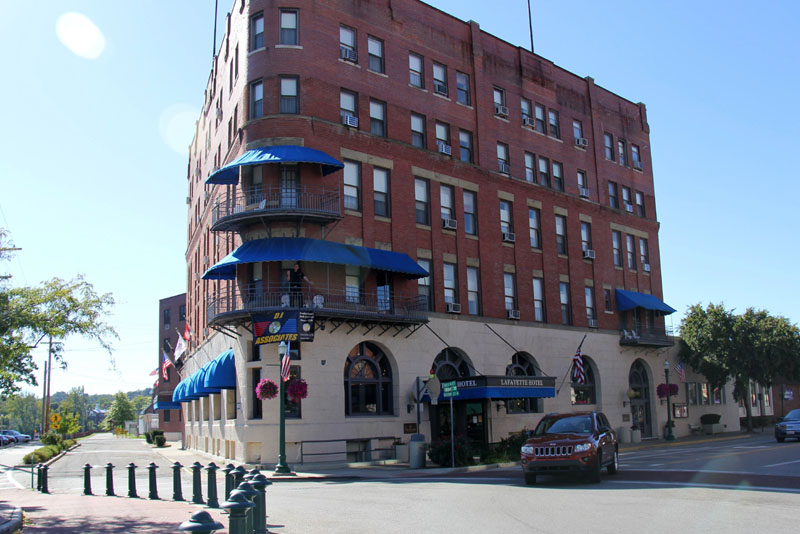 |
Lafayette Hotel, Marietta, Ohio |
Here I am standing on the New-Orleans-style wrought-iron balcony holding my post-ride glass of Macallan. Inside, my room's ornate dark wood furniture and richly-patterned fabrics reflected the "historic riverboat era" the hotel dates from, being almost a hundred years old. Marietta was named after Marie Antoinette, in tribute to France's help to the United States during the Revolutionary War. The hotel is named after the French Marquis Lafayette, who served as an American general in that war, and who visited Marietta during an American tour in 1824-25. Now, 180-some years later, Michael and I were visiting Marietta on our American tour.
Marietta is sited at the confluence of the Ohio and Muskingum Rivers, and like many of America's river towns, it is frequently troubled by spring floods. The most notorious flooding rose over ten feet in the Lafayette Hotel's lobby during the 1930s, but every few years the overflowing rivers reach at least the lower lobby level. The hotel's solution is ingenious - the carpeting and wall panels of the ground floor are removable, and are taken upstairs when the waters rise, then easily reinstalled when they recede.
The parking lot across the street had a "Motorcycles Only" space, which is always endearing to us Scooter Trash (or West Side Beemer Boyz), and the Gun Room restaurant in the hotel offered good plain food. The previous photo was taken on our September visit, on a bright sunny day, while a rainy October day gave this view of Front Street - a seemingly thriving example of small-town America's traditional Main Street.
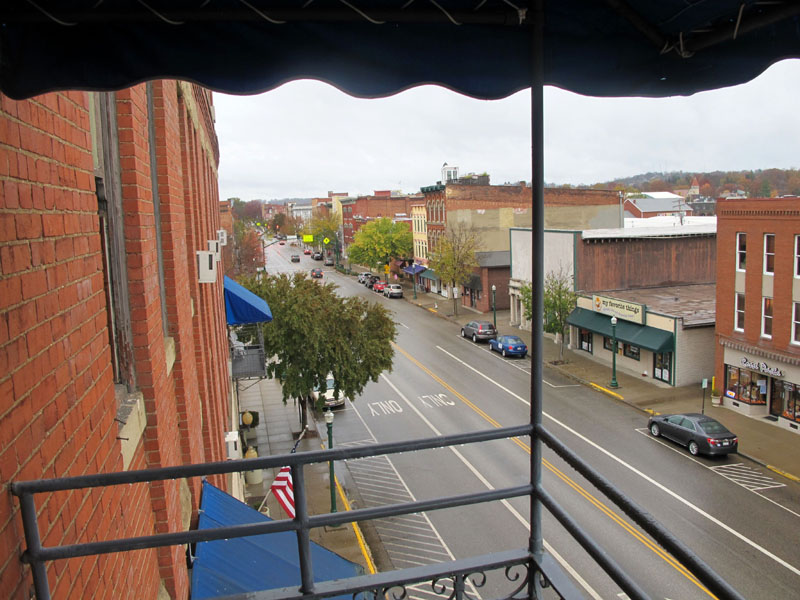
In the rainy twilight, migrating Canada geese and snow geese rested on the riverbank, while rafts of ducks floated downstream. Behind them, a massive train of barges pushed by a low-riding tug appeared out of the dusk and moved slowly up the river. I was reminded of John McPhee's book Uncommon Carriers, in which he wrote about riding with a river barge crew in Illinois. Such river traffic was an important part of early American history, before and alongside the railroads, and is still surprisingly active today.
Marietta's history began at least 2,000 years ago, with the so-called Hopewell culture that constructed massive earthworks, of which some remnants are still preserved in the area. In 1770, George Washington, then a British colonial surveyor, visited the Ohio Valley, and encouraged its suitability for settlement. The first soldiers and settlers arrived in 1788 at the confluence of the Ohio and Muskingum Rivers, building forts against the indigenous people, like the Shawnee, who did not welcome them.
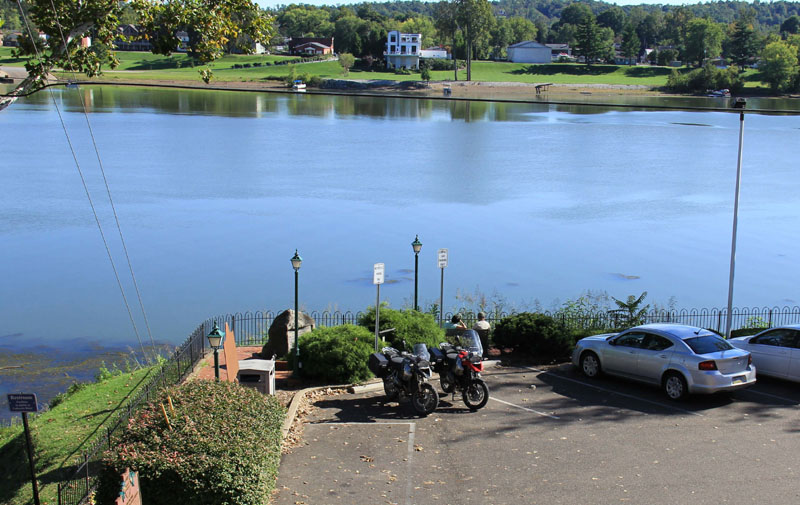
Despite that hostility, George Washington said at the time, "No colony in America was ever settled under such favorable auspices as that which has just commenced at the Muskingum ... If I was a young man, just preparing to begin the world, or if advanced in life and had a family to make provision for, I know of no country where I should rather fix my habitation ..."
From the Lafayette balcony, we look down at the "Motorcycles Only" parking spot, and across the Ohio River to West Virginia (strikingly-modern house on its bank). A sign in the left corner reads "Restroom Facilities Available in Lafayette Hotel." Again, an example of Ohio neighborliness that is not always found elsewhere. A running/cycling path along the riverbank actually seemed to be used by the citizens - which again is not always typical.
Just behind the bikes is a large marker stone with the following inscription:
SOUTHERN BOUNDARY
PICKETED POINT
THIS STONE IS PLACED TO KEEP
IN REMEMBRANCE THE HISTORIC
POINT WHERE DWELT DURING FOUR
YEARS OF INDIAN WAR 1791 - 1795
EARLY SETTLERS OF OHIO
Erected by the Woman's Centennial
Association 1903
In the early 1800s, Marietta College was used as a station on the Underground Railroad, helping slaves to escape north. Industry, railroads, and steamships all played a part in Marietta's development, as did oil booms around the turn of the 20th century. Today its population is about 15,000 people, and to me, it is simply ... a nice little town.
In October, the weekend before Halloween, the Lafayette was hosting a "Murder Mystery Weekend," with costumed characters appearing around the hotel, and that seemed kind of quaint and fun. A bar across the street was having a costume contest (I told Michael, "You should go - disguised as a human being!"), and it raged until very late, loud voices waking me in the small hours.
To us, Marietta's most important quality is that like Williamsport, Pennsylvania (which I was delighted to learn is locally called "Billtown" - that's cute - and twice we have enjoyed an unexpectedly sophisticated restaurant, 33 East), or Iowa City, it is just big enough to be "accommodating," and strategically located among nice country roads between big-city showdates.
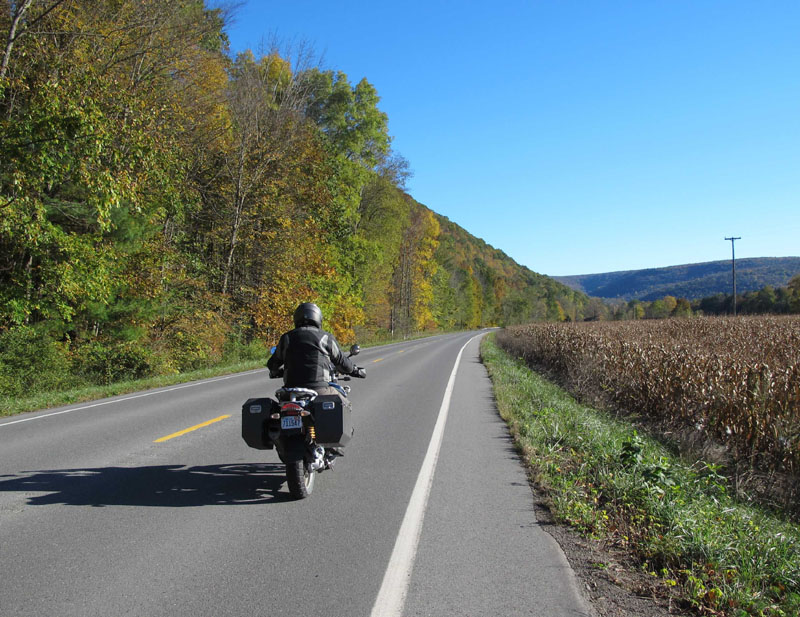 |
En Route to Billtown, Pennsylvania |
Speaking of riverboat towns, let us now take a quick trip down the Ohio to the Mississippi, and all the way south to its terminus at New Orleans.
In Roadshow I recalled how many years ago the band was playing in the gymnasium of Louisiana State University in New Orleans, and on a locker in our dressing room I saw a typewritten list entitled, "How to Stay Young."
It was attributed to Leroy "Satchel" Paige (1906-1982), a legendary pitcher from the so-called Negro Leagues. (Bandmate Geddy has been a major contributor to that heritage, donating memorabilia from his collection to the museum in Kansas City.) Satchel Paige's life and career spanned an incredible metamorphosis in American sporting and cultural history, and here are his words of wisdom:
1) Avoid fried meats which angry up the blood.
2) If your stomach disputes you, lie down and pacify it with cool thoughts.
3) Keep the juices flowing by jangling around gently as you move.
4) Go very light on the vices, such as carrying on in society. The social ramble ain't restful.
5) Avoid running at all times.
6) Don't look back. Something might be gaining on you.
Obviously, there is much good advice there, and after a series of hometown shows in Toronto and Montreal, the one that resonated for me was, "The social ramble ain't restful."
Extroverts gain energy in social situations, while introverts are drained by it. I always remember a question in a psychological handbook called Please Understand Me, in which a variation of Jungian archetypes was used to help define what kind of person you, or your friends, might be. The key question for me was, "Do you find social interaction energizing or draining?"
How people answer that question says an awful lot about them.
The book was given to me by a professional psychologist, who was later somewhat horrified to hear that I had been using it as a "party game" - having friends answer the questions and define their personality types just for fun.
But it was fun - and enlightening.
Some friends were mortified by what it revealed about them, and denied its truth - but to the rest of us, the resulting descriptions were both amusing and undeniably real.
The observation that "the social ramble ain't restful" comes especially clear to me on show days. Because I almost never stay after a show, but "bolt" straight from the stage to my bus, the only time I can entertain local friends or family is in the afternoon before soundcheck. Over time I have learned that I can sustain a maximum of two social encounters at that time. Three or more such "meet and greets" start to drain me to the extent that I feel it during the performance, in a way that rattles my concentration.
So ... before the first hometown show in Toronto, I planned to host my mother and father for dinner in the Bubba-Gump room, and to meet with my first drum teacher, Don George - for the first time in over forty-five years. In 1965, at the age of thirteen, I started drum lessons with Don at the Peninsula Conservatory of Music in St. Catharines, Ontario. When he stopped teaching there a year or so later, I didn't see him again until the day of that first show in Toronto, on October 14, 2012.
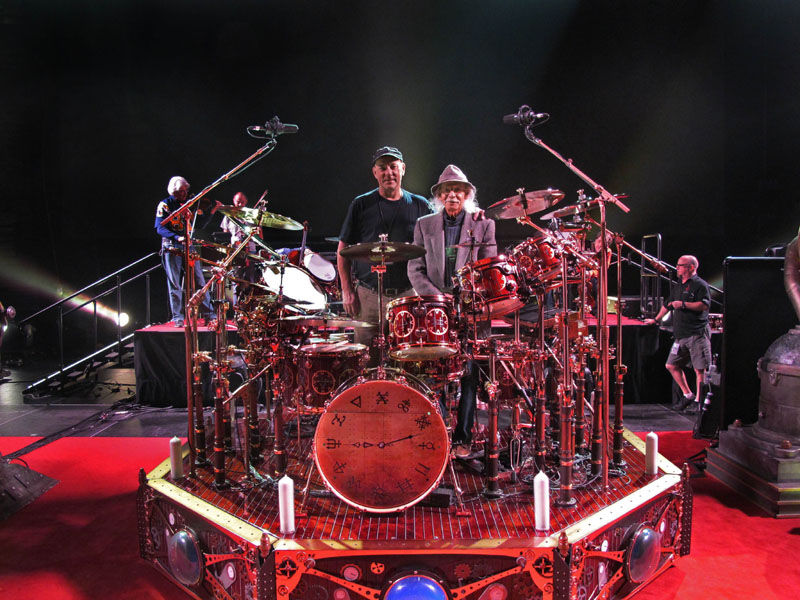
In recent years Don and I had been in touch by mail and email, and he sent me videos of his current teaching ideas and methods. I was pleased to see that he was obviously still a gifted and dedicated teacher. For his part, when talking about this long-ago student, Don was once quoted, "Neil didn't have another teacher for thirty years, so I must have done something right."
And he did - Don gave me a strong enough direction toward what I needed to know that I could follow it through those decades. Most of all, he gave me the encouragement that I could be a drummer, if I worked at it. Essentially, Don kept me climbing that mountain for three decades, until I needed Freddie Gruber and Peter Erskine to guide me to higher elevations.
Unfortunately, while I was struggling up the mountain that night (every night a mountain, and me always Sisyphus), I had a painful attack of tendinitis in my left elbow. The previous morning, after a show in Philadelphia, I had awakened on the bus lying on that arm, and feeling a sharp pain. It didn't bother me on the motorcycle that day, riding through the Catskills and Adirondacks of Upstate New York to Cape Vincent for the night. (A couple of signs I noted that day - a small-town bar offering "Warm Beer, Lousy Food," and a sign in front of an old church reading, "For Sale By Owner." I had to think about that for a few miles - "Who owns a church?") Next morning my elbow felt tender, but tolerable, crossing into Canada on a cold, rainy morning via a pair of ferries through Wolfe Island to Kingston, and a long wet slog along Highway 401 to Toronto.
Michael astonished me that morning. Leaving Cape Vincent early, before breakfast or even coffee, we loaded the bikes in the rain and caught the little ferry to Wolfe Island. There we passed through the tiny open-air (open rain) border crossing with minimal fuss, then rounded the island through steady rain and fog. At the dock in Marysville, where we had caught the Kingston ferry a couple of times before, a sign announced that the ferry dock had been moved a few kilometers up the road. (Later I learned it was the "winter dock.") We arrived at a raw-looking installation of concrete and steel, but there were no signs giving ferry times. It was a Sunday morning, the weather was bad - maybe there wasn't one. We stood in the cold rain, undecided and a little anxious. My brain was busily planning alternatives - figuring where the nearest bridge to Canada was, if we had to backtrack. Out of nowhere, Michael said, in apparent seriousness, "I love it when we do stuff like this."
I turned and just stared at him, with a look that spoke volumes, and said, "Oh, shut up." Or possibly something stronger.
But he continued to play it all earnest, and insisted, "No, I really do - it's an adventure!"
Maybe he really was serious, at least at that moment, but trust me, dear reader, Michael does not often express enthusiasm for my little "excursions." Especially in bad weather. Maybe it was a feeble attempt at a joke. (Or manliness.)
See, there I go again. It is obvious that I often use Michael as the butt of cheap humor (did that come out right?), but I swear I never stray far from the truth. With that pledge in mind, as this story spins out, the reader will see how the scales fall ...
In any case, it was me who was "unmanned" during that night's show, as the pain in my elbow grew steadily worse. Toward the end it hurt so badly that I simply couldn't hit as hard as I usually do with my left hand. Before the second Toronto show, I consulted a local doctor, who prescribed some anti-inflammatories and an elbow brace, and that helped me enough that at least I could play properly. It still hurt quite a lot, but as I had learned during a similar attack on my other arm, back on the Test for Echo tour in 1997, I didn't mind the pain as long as it didn't interfere with "the job."
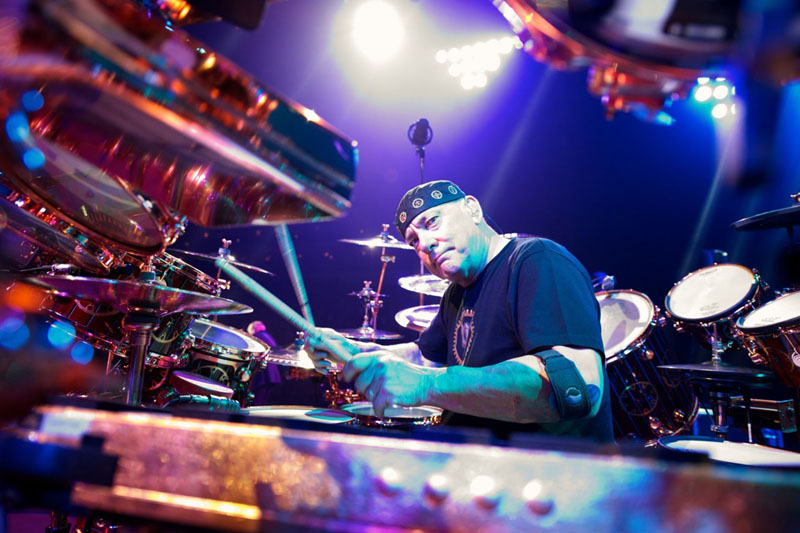
This tour Michael has been encouraging me to share occasional brief messages or photographs on social networks, under the banner of the West Side Beemer Boyz (Michael, Brutus, and me). One of the first such messages (I call them "twits") I authorized Michael to launch was a wry observation about the "gems" he told me he was sharing with his own "followers."
(And isn't that word-choice an interesting reflection on how such public oversharing is growing into something like a religion?)
When I sneered the following accusation at Michael, he insisted we had to twit it. So I double-dog-dared him.
"All you do is text meaningless nonsense to people you don't even like."
For our collective audience for the West Side Beemer Boyz, I started out tentatively, as I had years ago when we launched the website. Every few days I approved a scenic motorcycling photo, or offered a few pithy remarks that I hoped were fun or provocative. Each of those was introduced with "Bubba sez," for authenticity.
For example, "Bubba sez, 'Vengeance is for losers'" (as it must be), and "Bubba sez, 'What doth it profit a man to ride 450 miles, of which 50 are nice?'" That existential question referred to the North Dakota ride which made up a good part of the previous story, "The Better Angels," and a few commenters nailed the correct answer: the profit is "50 miles."
Sometimes on the bus after the show, when Michael and I were liberally refreshed and feeling highly amusing, we discussed ideas for twits that were ... let's say, controversial. So I established the "Atatürk rule."
See, Mustafa Kemal "Atatürk" (meaning "father of the Turks") was an enlightened, cosmopolitan leader of Turkey in the 1920s and '30s. He was determined to build a Westernized, secular state, and early on outlawed the fez and the burqa. However, Atatürk was a drinking man, and late at night, in his cups, he was given to issuing wild commands - like, say, "Napalm Ankara!" So, his attendants learned to postpone taking any action until the morning, when they could ask their president if he had really meant those orders. Often enough he would cringe and say something like, "Oh dear, no, no."
Clearly, the "Atatürk rule" on late-night, over-refreshed communications of any kind is something many people would be wise to adopt.
After some painful nights onstage, my after-show suffering inspired a couple of cryptic messages that I did have to allow Michael to send. By way of explanation, motorcyclists who adopt the old-school "biker" pose refer misogynistically to riding on the pillion, or passenger seat, as "riding bitch." Thus I offered the defiant stoicism, "Bubba sez, 'Pain rides bitch.'"
Later, we sent out another expression of will conquering pain, which turned out to have biblical roots: "Bubba sez, 'The body is a good servant, but a terrible master.'"
Matt Scannell's childhood friend Doctor James (or "Bro-Doc", as I have dubbed him), gave me reams of information and recommendations for treating the condition. He informed me that it was properly called "lateral epicondylitis," which I much preferred to the frivolous-sounding "tennis elbow." Along with the brace I wore while drumming, Bro-Doc James recommended icing the area immediately after the show, and wearing a splint at night that would immobilize the wrist from overextending that tendon in my elbow. The only real treatment was rest, and that wasn't possible. Back in '97 I had played with pain and an elbow brace until the end of the tour, and then it didn't really get better until a month or two after.
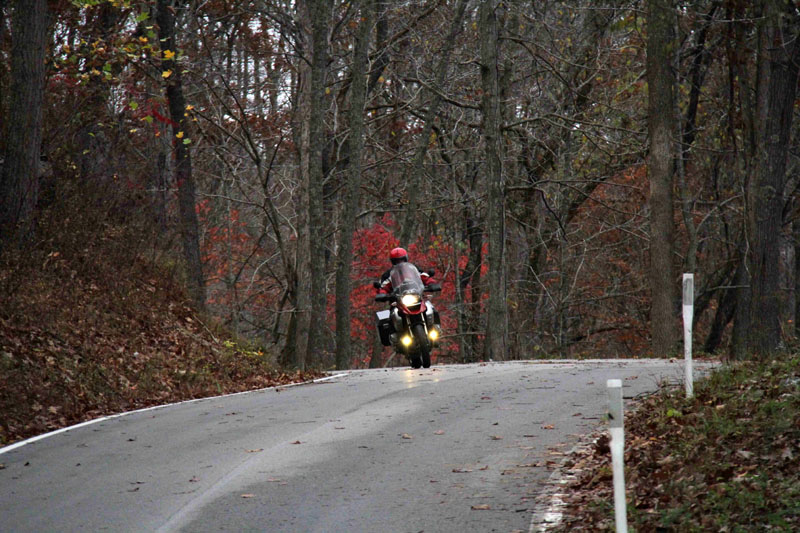 |
Kentucky Rain |
A big story along the East Coast in late October was "Frankenstorm." (I prefer the Germanic, heavy-metal Frankenstürm.) Hurricane Sandy was predicted to merge with other weather patterns and create an unstable and dangerous vortex. In the days before, for the first time all tour I had the television on in my hotel room, tuned to the Weather Channel, as it was on the bus. As we moved south from shows in Buffalo and Cleveland to Charlotte and Atlanta, I began navigating not by the maps or through my usual favorite areas, but by the weather patterns.
Even then, staying inland and at lower elevations down through Ohio and Kentucky, we endured steady rain, wind, and cold temperatures - forty-two degrees. All day. That morning, with heavy rains predicted, Michael had argued that we should just stay on the bus, and not ride in that weather, "It's not safe, it's not smart, and it's not fun."
Michael doesn't like riding in the rain, but I don't mind it. (I did mention to him later that day that we hadn't seen a single other motorcycle on the road for three days. He grumbled sarcastically, "Yeah - all those other riders must be crazy to miss out on this.") There are only two weather conditions that will make me call off a ride: lightning, and snow. One summer morning a few tours ago we woke up on the bus around Jefferson City, Missouri, with thunder and lightning all around, and the satellite pictures showed those conditions prevailing all the way to the show in St. Louis. For many years I hadn't known that lightning could kill you on a motorcycle, but once I learned that, I feared it. So we stayed on the bus that day.
One morning last April we woke up at a motel in Sarnia, Ontario, to see the ground - and bikes - covered with snow. It was a day off anyway, so we just took a "snow day," and were able to ride to the show in Hamilton the next day.
This time, Frankenstürm was predicted to drop two feet of snow in the higher elevations of West Virginia, so although those mountains were the way I would have preferred to travel south, we stayed away from that area. (They got that snow, too - even while Sandy was pounding New Jersey and New York City.) I figured I could route us down through the backroads of Kentucky to Knoxville, Tennessee, safely, with only the minor inconveniences of cold and rain. (And Michael's melodramatic fake shivering and teeth-chattering at every stop.)
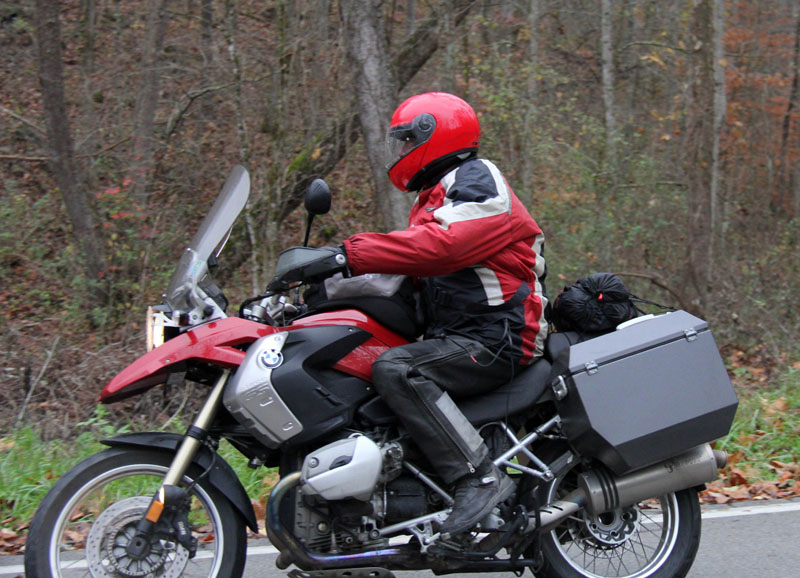
In a Roadcraft aside on riding gear, here is what it takes to withstand that kind of weather. (Even at fifty miles-per-hour, the wind-chill factor at forty-two degrees is well below freezing.) Waterproof leathers, boots, and thick insulated gloves, and a plastic rain jacket to cut the wind. The wiring visible above my leg is for the heated vest, which is like an electric blanket around my torso, worn between two cotton turtlenecks which are further cinched around the neck by the rain jacket's hook-and-loop. One's neck can be particularly vulnerable to cold and wet, but the Schuberth helmet is well designed in that area. The handgrips are electrically heated, which also makes a huge difference. Long underwear, sock liners, and - in the extremest cold - a thin balaclava under the helmet. (We even have electrically-heated socks and gloves, which saved us in the cold spring of 2011 - see "Eastern Resurrection" - but didn't resort to those this time.) The riding pace has to be relaxed and smooth, lean angles minimized, braking and acceleration gentle.
Getting from Knoxville to Charlotte, though, would be a problem. The forecast over the Smoky Mountains to Asheville was for thirty-three degrees and snow, so I arranged with bus driver Dave to meet us the next morning at the hotel in Knoxville (another old-time, downtown property we took a chance on, the Oliver Hotel, and it was nice). We loaded the bikes into the trailer and rode the bus to Charlotte, and sure enough, looked out at heavy snow on the trees beside the interstate, and it was thirty-three degrees.
I was gratified to see my judgment vindicated, and as Michael, Dave, and I looked out the bus windshield at the snow-covered trees and rocks, I sneered to Michael, "See? I know when 'It's not safe, it's not smart, and it's not fun.' I might be crazy, but I'm not stupid!"
He said bad words and turned back to his computer.
Charlotte was the night before Halloween, and lately we had been seeing plenty of decorations around the Midwest. I read once that Halloween was the second-most widely celebrated holiday in America. (The first might be a tossup between the Fourth of July and Superbowl. But no, I kid - I'm sure it was holiday spending they were talking about. So of course, Christmas.) Pumpkins, witches, skeletons, and cornshocks decorated housefronts, and white-sheeted ghosts hung from cobwebbed trees. Some yards were decorated with little cemeteries of cardboard headstones celebrating the death of "Cancer," "War," and - wait - did that one say "Democrats?"
Our two female string players, cellist Adele and violinist Audrey, appeared onstage in wildly elaborate face makeup that night, from David Bowie's Aladdin Sane to rhinestone arabesques. The Guys at Work and I always appreciate it when those around us go out of their way to entertain not just the audience, but us.
On the day off after Charlotte, I would like to have routed us through the mountains of North Georgia toward Atlanta, but even there the temperatures were in the thirties, so I kept us to the Piedmont and Low Country of Eastern Georgia and South Carolina. There we finally felt a bit of relief, seeing the bike's thermometer rise into the fifties and low sixties, as we rode under a canopy of oaks and Spanish moss to a night of rare luxury at the Palmetto Bluff Resort along the May River in South Carolina.
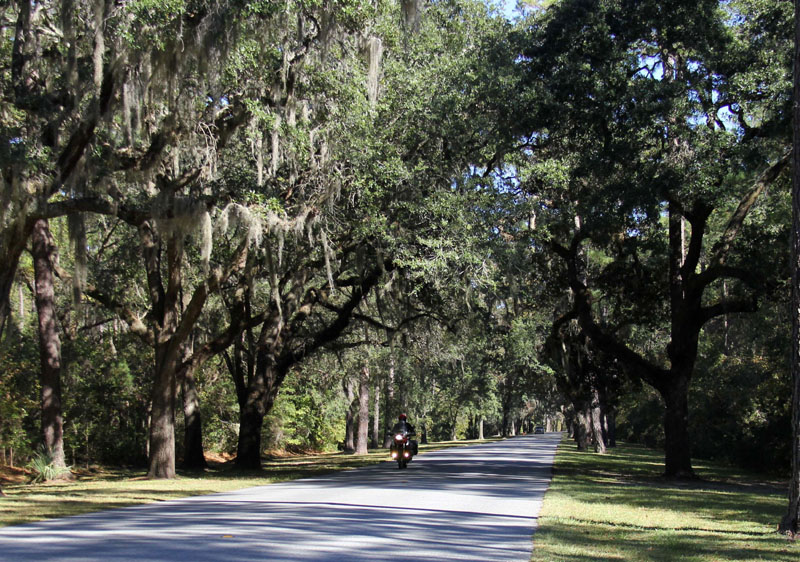 |
Spanish Moss |
In fact, it is neither "Spanish" nor "moss," but a so-called "air plant," or "bromeliad" (pretty word), which takes nourishment directly from the air. Thus it is not a parasite on the trees, though too much of it can block the light necessary for the tree's photosynthesis. And the weight of all those hanging plants, especially after rain, can cause branches to break. The graceful gray beards hanging from oak and cypress trees are a romantic symbol of the Old South, and a staple of the "Southern Gothic" atmosphere. One interesting bit of trivia is that the seats for the Ford Model T and other cars and carriages of the era were stuffed with Spanish moss.
Riding across Georgia and Northern Florida, I noticed that Spanish moss most often appeared around houses and in towns, apparently cultivated for its decorative appeal. Easy enough to do - you just hang it on a tree and it grows - but I was sure I remembered something about that symbolic plant almost dying out years ago. The story was hard to find, but turned out to be true; in the 1970s a blight attacked Spanish moss across the South and almost wiped it out, until a blight-resistant strain of the plant rebounded. It is certainly widespread once again.
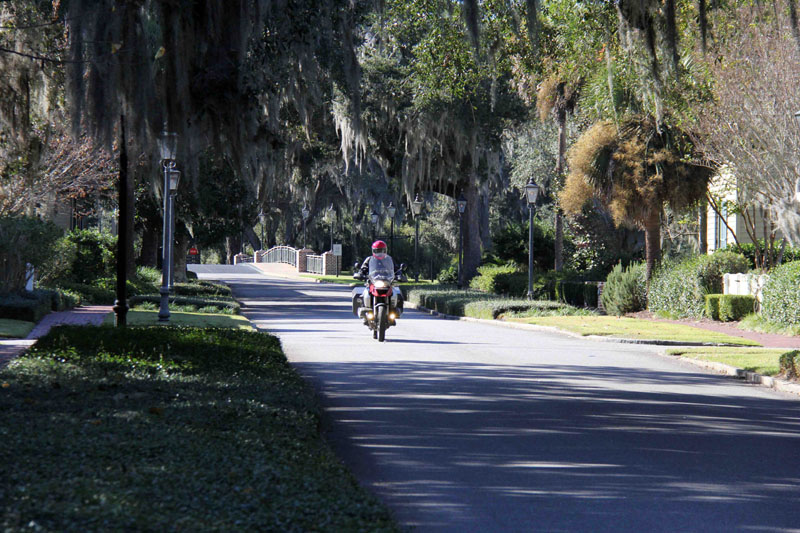
These trees with their long gray beards have a melancholy, even mournful look, like the weeping willows I grew up with in Southern Ontario. (The first home I owned, a farmhouse near Beamsville, Ontario, had a big willow in front, and I used to like climbing its thick branches to a high perch.) Another sad-looking tree is the weeping yew, which I had planted around the memorial to my first wife Jackie and daughter Selena.
Those thoughts about sad trees converge because we have been visited by another family tragedy - manager Ray's twenty-three-year-old son Shane was struck down by a brain tumor, succumbing on November 1, only nine weeks after the terrible diagnosis.
It was the day of our show in Atlanta, and that night Geddy gave a subtle reference to Shane in his introduction to "The Garden," which had been one of Shane's favorite songs.
Two nights later, after the final show in that leg, in Tampa, I flew to Toronto with the other Guys at Work in their "bus" (Challenger C-605), and spent some time with Ray. I knew how it felt to lose a child. After fifteen years, I think of Selena every single day, and from time to time (birthdays, black anniversaries), I am still rendered helpless with grief at that unbearable loss.
Before heading for the airport to get back to my own (second) family in Los Angeles, I attended the memorial gathering, and it was achingly sad and hard for me to bear. My sorrow must have been obvious, because it seemed like Ray was comforting and supporting me.
And in the following days I received messages from several friends asking if I was okay.
The gathering was held in the same "Visitation Centre" at Toronto's Mount Pleasant Cemetery where we had mourned Andrew MacNaughtan earlier this year - and from where you could just about see my first family's memorial. (I do not visit it, though I know others do, and are comforted by it.)
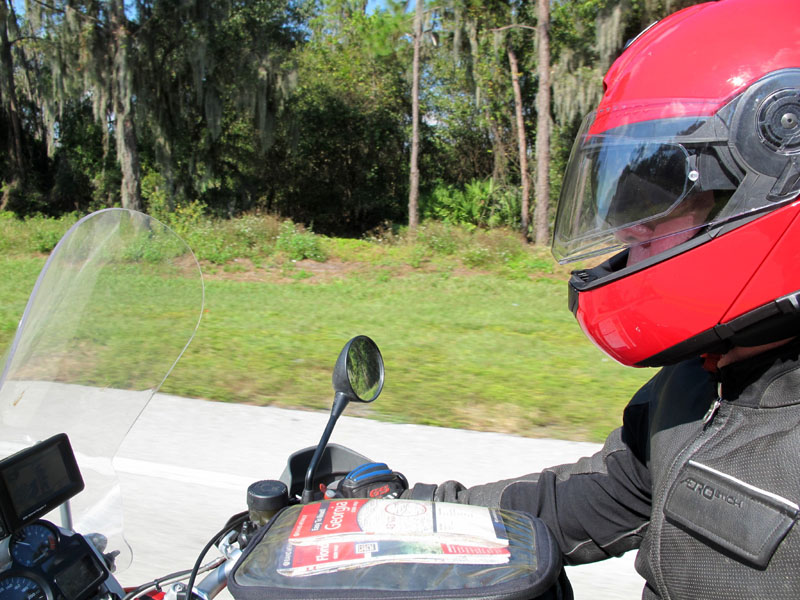
I think of the lines from "My Way,"
"I've lived, I've laughed and cried/ I've had my fill, my share of losing."
Witness to fall after fall - and I'll keep riding on. With pain riding bitch.
But enough darkness. It just seems right to share a little of the shadows as well as the light. Many people cling to the fantasy that an elusive phantom called "success" or "wealth" would bring them freedom from pain.
Let me tell you, it does not.
To strike up a brighter memory, when Brutus and I were rambling around Muskoka north of Toronto, I saw a sign for a place called Windermere. The sign pointed left, away from our route, but on a whim I led us on a brief detour. In the winter of 1982 the band spent a few weeks at a resort on Lake Windermere, working on the songs for our Signals album. I had never been back since, and thought it might be fun to see the place again. We had worked there in late winter, with four feet of snow quilting the ground, trees, and buildings to create a surreal white world. The resort hotel itself was closed and shuttered for the season, and looked like a scene from The Shining, its massive bulk mostly buried under a deep shroud of snow. I went showshoeing there for the first time in my life, across the frozen lake under a full moon.
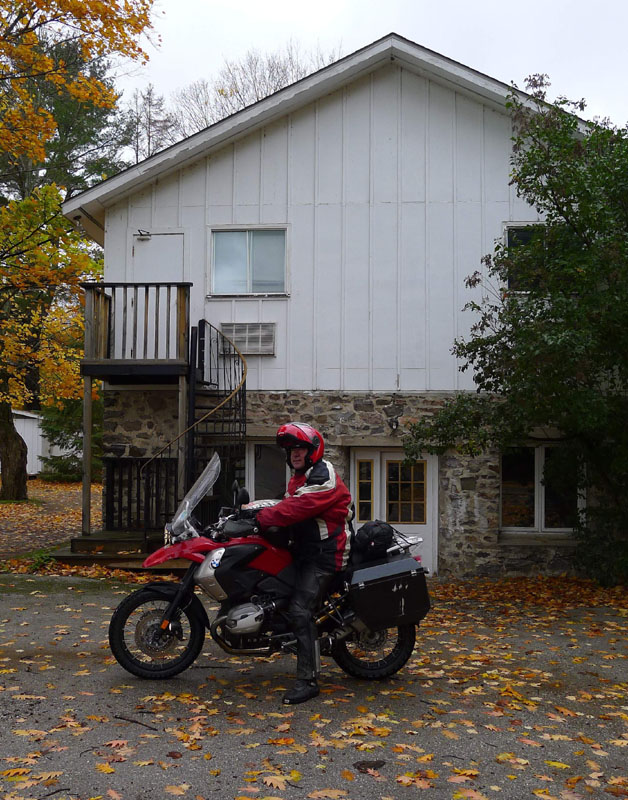
We stayed in some small condos nearby, and our gear was set up on the second floor of one of the resort's outbuildings. As Brutus and I rode up to the compound, I saw the huge white hotel of Windermere House looking well-tended and prosperous. The lakefront condos where the band and crew had stayed had been replaced by more upscale accommodations, but when we rode behind the hotel, I saw the very building we had worked in, looking remarkably unchanged after thirty years.
I had Brutus snap my picture in front of it, and emailed the photo to Alex and Geddy under the title "Pop quiz," with the caption, "Where am I?" Alex nailed it right away, and at dinner together before the next show, we shared a good laugh about our memories of that time. On the Clockwork Angels tour we have been playing two songs from the Signals album, "Subdivisions" and "The Analog Kid." In another coincidence, our friend Ben Mink was guest violin soloist on "Losing It," and one of the members of our Clockwork Angels String Ensemble, Jonathan Dinklage, told us he had been inspired to learn to play the violin by that performance.
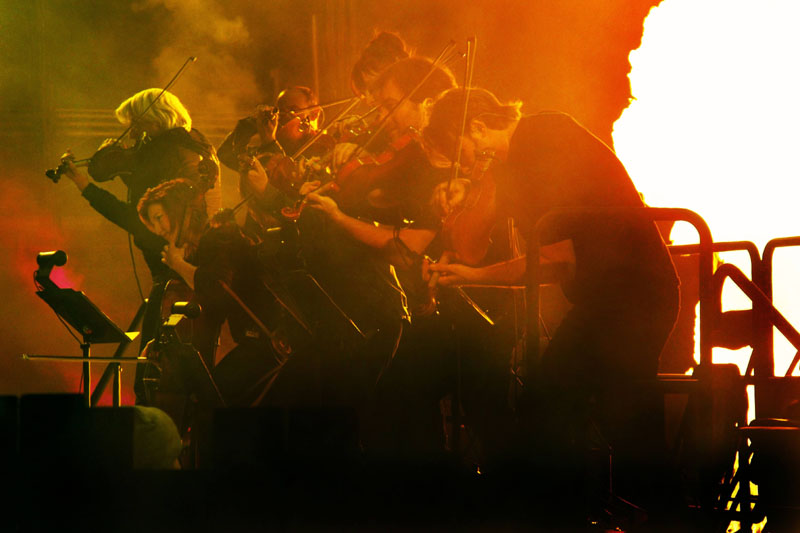
And we continue to be inspired by that rockin' string section - more and more it feels like when we are on stage with them our little trio grows into an eleven-piece band. The Atlanta show was outdoors, and with the crazy weather afflicting the East (I always liked how one climate scientist explained that "global warming" was too simplistic a description of these times of climate change - he said it was more accurate to call it "global weirding"), the temperature around showtime was predicted to be in the forties. My sympathy went to the people in the audience, mainly, because we would have the stagelights, and with the activity of drumming, I would be creating my own heat. (The only difference would be that I wouldn't turn on the little fans that cool my hands and back - usually needed by the second or third song, but not that night.) However, my bandmates and the poor string players would also suffer. For once the "stringers" wouldn't mind the "wall of fire" pyro effects behind them - which are usually both uncomfortable and a menace to their delicate and precious instruments. Cellist Adele had told me that she and Jacob stood up and hunched over their cellos during that part of the show - not to "rock out," but to protect their instruments from the heat.
In Atlanta we also had visits from Peter Collins, coproducer of Power Windows, Hold Your Fire, and Counterparts, and Nick Raskulinecz, "The Mighty Booujzhe," coproducer of Snakes and Arrows and Clockwork Angels. From the start of the second set, the Clockwork Angels songs, Booujzhe stood in the pit in front of us, conducting and miming along with every note, beat, and word. I couldn't help laughing, then had to look away because it was making me weak.
Finally, perhaps the biggest news of all in the fall of 2012 was the American presidential election. The night I flew from Toronto for a few brief days at home, still reeling with sorrow for Ray's family, I received a text from Michael saying, "We won!!!! No magic underwear!!!"
(Like many of Michael's utterances, that one might require an explanation to some "normal" people. See, devout Mormons are required to wear at all times what they call "temple garments," or simply "garments." These resemble a two-piece set of underwear, decorated with symbols chosen by church officers to protect the wearer from harm. So, in effect, they are indeed something like "magic underwear" - in the minds of derisive gentiles like Michael. Wouldn't think of it myself ... )
But look at me - I have managed to come all this way (over 6,000 words about almost 4,000 miles of motorcycling across the American East) without even mentioning religion, let alone ragging on it. But it was bound to become inescapable - just as it seemed to become for American voters.
Mormon readers have sometimes written to thank me for being respectful of their history and their struggles - and I am. But that doesn't mean I would be comfortable with one of the self-styled "saints" (or the one Michael suspects is their "anointed prophet") in the White House. Neither would I welcome a Scientologist, fundamentalist Christian, Hasidic Jew, or Wiccan. It's not prejudice or "profiling" - only that to your average rational person (or to each other - think about how a Mormon looks at a Scientologist and vice versa!), such beliefs are so far out there. Worse, the fanatical defensiveness about those beliefs is frightening.
Likewise, I have only commented "observationally" about politics. But it has to be said that this was an anxious election for those of us who worry about true individual rights (key question, perhaps: "Does a woman own her body?"), compassionate government, and the separation of church and state.
I define myself as a "bleeding-heart libertarian," unwilling to let people suffer unnecessarily (even if it's "their own fault"), so I am repelled by the cold-hearted and crypto-racist attitudes of the so-called "Christian" right. Michael is what Republicans call a "RINO," or "Republican in name only," which can probably be defined as "right-wing liberal" - politically conservative, socially liberal, and not sympathetic to religious influence on society at large. As he clarifies it, "I'm a registered die-hard Republican. I only seem liberal because I believe hurricanes are caused by low barometric pressure and not by gay marriage. My party left me!"
Generally, while believing in individual rights and responsibilities, we favor the classic liberal values of generosity and tolerance, and fear the religious oppression that has wormed its way into modern Republican platforms. (And that is a good metaphor.)
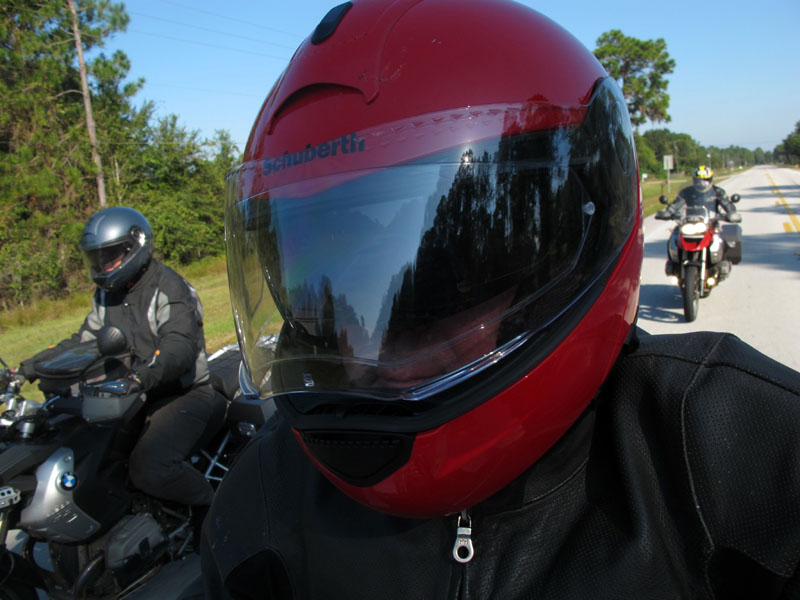 |
Michael, me, and Wes |
A huge billboard in Florida asked, "Sick and Tired of Hope and Change?" followed, of course, by "Vote Romney." Were it not for the snowbirds and retirees, Florida would likely be the reddest state in the Union. On a Saturday afternoon, as Michael, guest rider (and Florida native) John Wesley and I rode through Florida towns to the Tampa show, Tea Party activists stood on many street corners railing like Old Testament prophets, waving signs and flags, while passing drivers honked in support. Church signs urged us to "Pray - then vote wisely." One announced a "Prayer Vigil Nov. 5," and we could imagine what they wanted to pray for. (Or against.) At the Tampa venue, Michael called me outside to see what a skywriter had printed across the sky: "LOVE GOD VOTE."
In the fall of 2012, I was witness to all that, and feared its Frankenstürm of fear and sanctimony would overwhelm the country. However, like many, I was relieved that the radical fringes could not prevent the Fall of the Prophet, or hold back the forward motion of hope and change (see "The Better Angels"). Still, the people of the United States remain divided almost exactly in half - like so much of our sad and beautiful world.
Once again, I can only hold up the compassionate wisdom of Philo of Alexandria, who said 2,000 years ago, "Be kind, for everyone you meet is fighting a hard battle."
Because we are, aren't we?